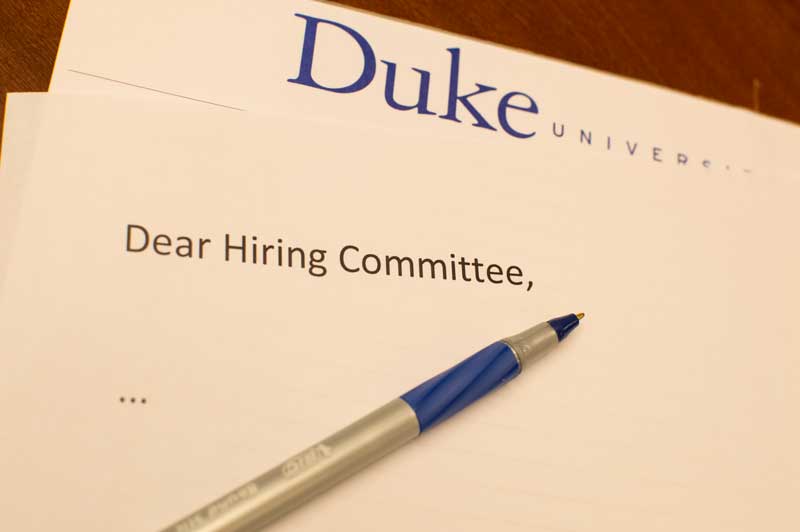By Maria LaMonaca Wisdom
Director of Graduate Student Advising and Engagement for the Humanities
Last week, Versatile Humanists at Duke co-sponsored a workshop on the art of the academic cover letter for humanities and social science Ph.D. students. Although the workshop was formally facilitated by the TWP Writing studio, the event was supported by no fewer than eight staff and faculty members across three units at Duke: the Career Center, the TWP Writing Studio, and VH@Duke.

The abundance of experts in the room may sound like overkill, but as we launched into an informal group discussion of the perplexing genre known as the academic cover letter, it felt like exactly the right approach. In addition to the Duke staff and faculty—hailing from different academic disciplines, with varied job-search histories—the grad students also contributed their own perspectives and insights.
Having so many diverse perspectives in the room highlighted some core truths about the academic job letter. Your discipline has a set of conventions with which you, as an applicant, should be familiar, and each letter needs to be tailored to the job description. But beyond these important considerations, no one can present you with a bunch of hard and fast guidelines about how best to represent yourself to a hiring committee.
Indeed, the more rigidly a letter adheres to a set of rules, the less likely it is to convey an accurate and engaging sense of who you are as a scholar, a teacher, and a future colleague.
Seek Out Multiple Perspectives
The hard truth is that hiring committees vary tremendously. Each one also consists of people with different experiences and points of view (which is why they use committees for hiring in the first place). Even with the information provided by online job bulletin boards, you won’t have much insight about the potentially conflicting priorities and perspectives of committee members.
Whatever the tack you take in a job letter, accept that it probably won’t bowl over everyone who reads it. Maybe someone doesn’t like your dissertation director’s most recent book. Or dislikes your approach to feminist literary analysis. Or has a bias against everything Duke–on top of some bad sushi for lunch.
The point is, you will write a much better letter if you focus on crafting something that effectively conveys who you are, what you care about, and what you would bring to a college or university. Do this in terms that are accessible to scholars not familiar with your research specialty.
Writing a cogent, engaging and widely accessible letter almost always depends on good feedback. Consider putting together an informal “committee” to review your cover letters (or at least a couple versions of one) before you send them out. Most obviously, this group should include your dissertation director, your director of graduate studies, and peers (especially those who have already gone on the market). But you should also consider including
- a favorite professor outside of your program,
- me (shameless plug for VH@Duke), and
- a close friend or relative who isn’t an academic.
Don’t fall into the mistake of assuming that everyone on the hiring committee is going to be an expert in your field. Even when large departments in research universities set up search committees, they almost always include individuals outside the specified area. Depending on the institution and the needs of the program, committees may include people who are not even in the hiring unit or in your discipline.
What You Must Leave Behind
For those (most) of us who learned the rules of academic success by figuring out what individual professors expected on papers and then writing each accordingly, the invisible, unknowable Hiring Committee poses a real conundrum. In the face of such uncertainty, there may be an instinct to cast about for absolutes: the one authoritative job-search handbook, the perfect cover letter sample that you can follow almost verbatim, or perhaps the preferences of your dissertation adviser—whose confidence on the right way to structure chapter four of your thesis implies a similarly vast knowledge of job-search practices across academe.
Seeking out multiple perspectives is hard work, for you will inevitably confront the challenge of how to respond to different and likely conflicting pieces of feedback. At the end of the day, you will have to arbitrate such differences. That process can help clarify what sort of scholar-teacher you are becoming, and what sorts of academic positions may be the best fit for you.
——- ♦ ——-
As you emerge from five to seven years of graduate study, you may need to remind yourself of certain competencies that may have been underused for a while
——- ♦ ——-
There’s a popular book by Marshall Goldsmith entitled What Got You Here Won’t Get You There. This book is addressed to successful corporate executives, who rise through the ranks only to be stalled by certain habits or dispositions that no longer serve them. The larger point, as Goldsmith demonstrates, is that we can arrive at certain points in our careers where we can no longer rely on the strategies that initially made us successful. To move forward, we must abandon longstanding habits and develop new skills and competencies.
Ph.D. training in a humanities discipline hones many skills, but it doesn’t necessarily leave students in the best frame of mind for navigating an academic job search. As you emerge from five to seven years of graduate study, you may need to remind yourself of certain competencies that may have been underused for a while: confidence in facing uncertain situations, working (writing) in a collaborative environment, and (most significantly) trusting your intuition about who you are and what sort of academic career you wish to pursue. All of these competencies will serve you well as you write engaging and memorable cover letters, show up confidently in interviews, and make wise decisions about the future that stretches before you.
